

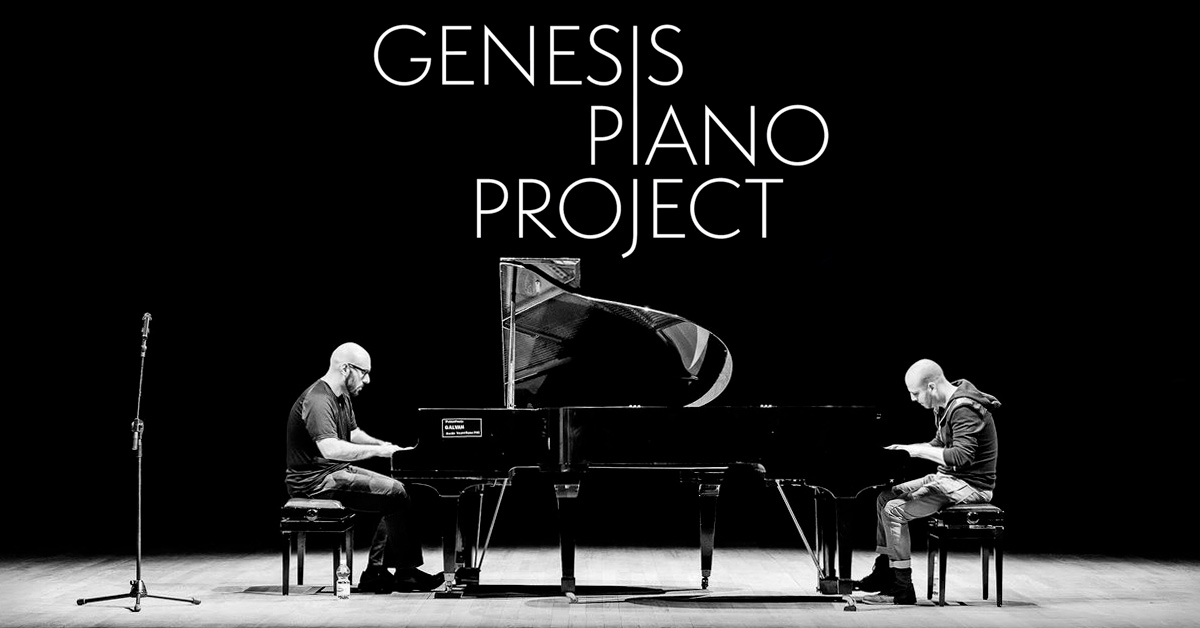
Almost a quarter of a century after the last creative (studio) output under the name "Genesis", the abundance of both cover versions of numerous Genesis pieces and appreciations of the band's work through sophisticated interviews with its members or through expert analyses is growing and growing, for example on Youtube. This consolidates Genesis' place in music history and more and more songs and pieces from their oeuvre are becoming classics.
A special form of appreciation of the work can consist of developing cover versions based on thorough analysis of the pieces and daring to prove that even ignoring the dimensions of "timbre" and "sung text" to the greatest possible extent, a fascinating composition exists. More than ten years ago, the two young piano students Adam Kromelow and Angelo Di Loreto also dedicated themselves to this goal. Their Genesis Piano Project, concerts with instrumental versions of Genesis pieces for two pianos, turned out over the years to be one of the outstanding undertakings of this kind, after two particularly noteworthy predecessor projects, both of which had already begun at the turn of the millennium: by Yngve Guddal and Roger T. Matte (Norway, also two pianos, two CD releases in 2002 and 2004) and by David Myers (keyboardist of the Genesis cover band The Musical Box, one piano, 3 CD releases in 2005, 2007 and 2010).
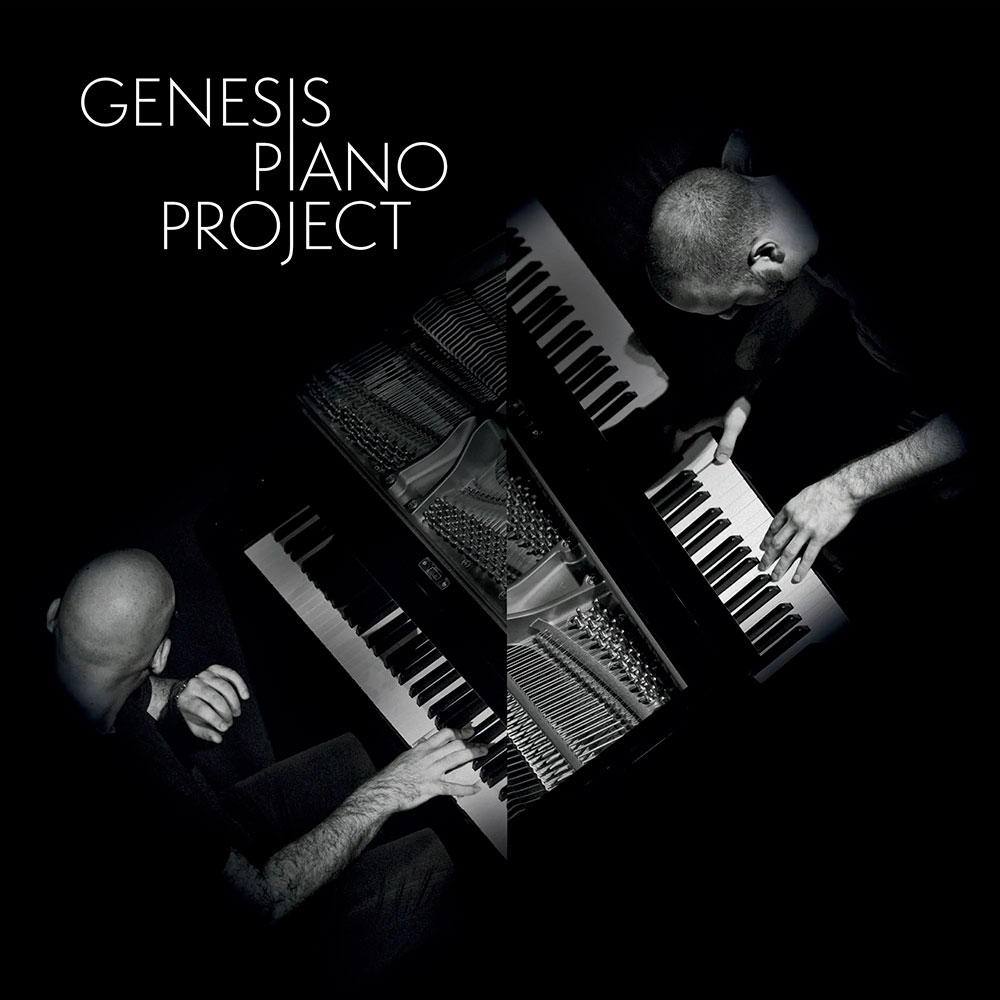 A great deal has already been said about piano transcriptions in general in earlier reviews. It seems interesting to ask to what extent the abstraction of the music to the piano or pianos is accompanied by stylistic variations. In comparison, Guddal & Matte seem to have remained stylistically closest to the originals; with Myers there are small, charming colourings with classical stylistic elements of earlier musical epochs; Di Loreto and Kromelow are also restrained here and want to stay in the genre of "rock piano", but here and there let their signature as jazz pianists shine through: They play rhythmically very to the point with a mostly strong touch, sometimes changing straight rhythmic figures into dotted or syncopated ones (a freedom that Phil already took as a singer on Ikhnaton And Itsacon, for example); they weave in fast scales in many places; and they allow themselves the recolouration of one or the other passing harmony, but always carefully (on As Sure As Eggs Is Eggs and what follows, however, they take a little more liberty) and only ever using harmonies that could have been found in Genesis itself as well (so at no time does it sound like, say, Herbie Hancock, who - incidentally - raised Peter's Mercy Street to a standard in 1996 with his piano version plus combo).
A great deal has already been said about piano transcriptions in general in earlier reviews. It seems interesting to ask to what extent the abstraction of the music to the piano or pianos is accompanied by stylistic variations. In comparison, Guddal & Matte seem to have remained stylistically closest to the originals; with Myers there are small, charming colourings with classical stylistic elements of earlier musical epochs; Di Loreto and Kromelow are also restrained here and want to stay in the genre of "rock piano", but here and there let their signature as jazz pianists shine through: They play rhythmically very to the point with a mostly strong touch, sometimes changing straight rhythmic figures into dotted or syncopated ones (a freedom that Phil already took as a singer on Ikhnaton And Itsacon, for example); they weave in fast scales in many places; and they allow themselves the recolouration of one or the other passing harmony, but always carefully (on As Sure As Eggs Is Eggs and what follows, however, they take a little more liberty) and only ever using harmonies that could have been found in Genesis itself as well (so at no time does it sound like, say, Herbie Hancock, who - incidentally - raised Peter's Mercy Street to a standard in 1996 with his piano version plus combo).
Even if you have two grand pianos and four hands at your disposal, the fullness and complexity of Genesis' music commits arrangers to the art of omission. Kromelow goes into this at length in our interview [conducted 18 November, click here to read it], especially using The Fountain Of Salmacis as an example. And he and Di Loreto seem to have mastered this art a bit better than Guddal and Matte - the arrangements sound more transparent without really missing any elements (of course also due to the production: you can hear the difference of 15-20 years). One thing that can never be left out is the vocal line, which is not infrequently emphasised by octave; one wonders only in some passages whether every syllable that Peter/Phil sings in the original on a constant pitch really requires a tone repetition.
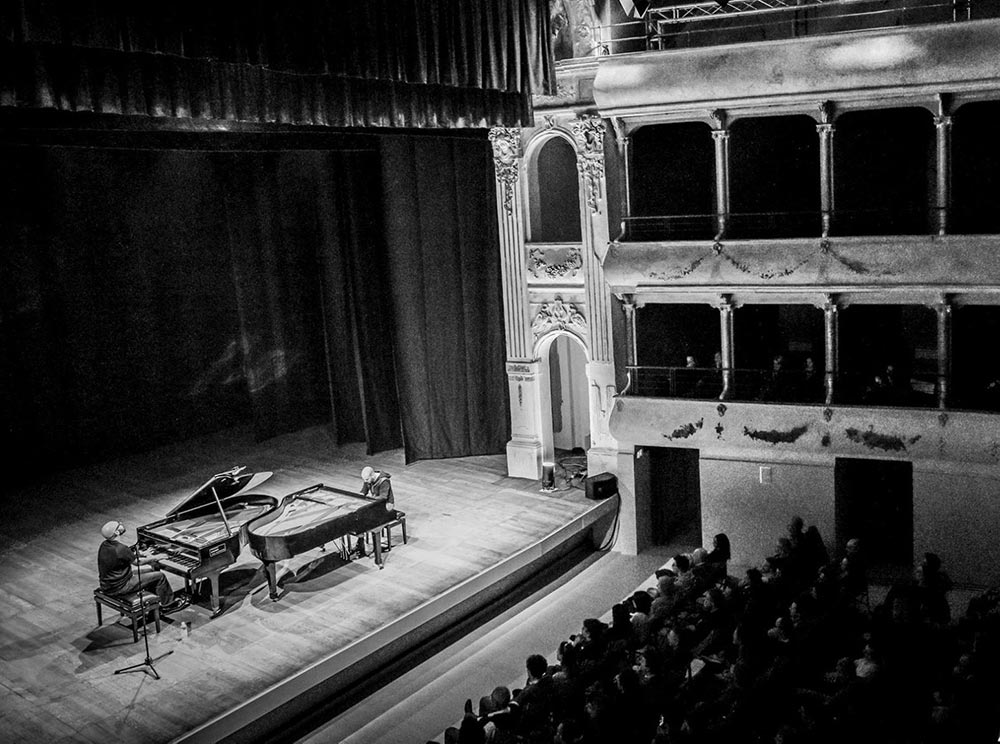 For this studio recording, the duo selected "only" eight arrangements from their repertoire and already recorded them in 2018. The pieces come from the albums Trespass to Wind & Wuthering. The tracks The Fountain Of Salmacis, Seven Stones and The Cinema Show had already been recorded by both Guddal/Matte and Myers. One For The Vine was on the programme of the two Norwegians, and there are reference recordings of Stagnation, Horizons, Firth Of Fifth and Entangled by Myers.
For this studio recording, the duo selected "only" eight arrangements from their repertoire and already recorded them in 2018. The pieces come from the albums Trespass to Wind & Wuthering. The tracks The Fountain Of Salmacis, Seven Stones and The Cinema Show had already been recorded by both Guddal/Matte and Myers. One For The Vine was on the programme of the two Norwegians, and there are reference recordings of Stagnation, Horizons, Firth Of Fifth and Entangled by Myers.
Two of the eight arrangements combine two pieces each. One: Firth Of Fifth goes directly into Tony's solo from Apocalypse in 9/8 after Steve's solo, and the closing sounds of Supper's Ready are again followed by the outro of Firth Of Fifth, extended, somewhat harmonically enriched and finally ending with a Horizons quote. On the other hand: Steve's early (almost) solo contributions For Absent Friends and (this time complete) Horizons follow each other directly in the shortest album track.
The arrangements are almost always excellently crafted, regardless of whether the original was already piano-based like One For The Vine or primarily guitar-based like Stagnation, which is particularly well done here. It's fair to say that drive, conciseness and transparency are the hallmarks of these recordings. In terms of dynamics in the playing, Guddal and Matte were ahead, with the Piano Project one can observe more of a terrace dynamic.
 In the mix, Kromelow's piano can be heard half-left, Di Loreto's half-right, as they were placed on stage from the audience's perspective. This is a decisive difference to the Norwegian recordings, where the two instrument(alists) were not so distinguishable. And while at the time one had the feeling of sitting with one's head next to the body of the grand piano that had been united from two into one, here one now thinks one can look into the two open grand pianos from an angle above and observe every single string - brilliant!
In the mix, Kromelow's piano can be heard half-left, Di Loreto's half-right, as they were placed on stage from the audience's perspective. This is a decisive difference to the Norwegian recordings, where the two instrument(alists) were not so distinguishable. And while at the time one had the feeling of sitting with one's head next to the body of the grand piano that had been united from two into one, here one now thinks one can look into the two open grand pianos from an angle above and observe every single string - brilliant!
(PS: And now another review would have to be done by someone who doesn't know the music of Genesis, at least the music from the 1970s, and who hears the music in a blind tasting much less biased, because he doesn't always have the originals running in the back of his mind...)
Author: Andreas Lauer
Genesis Piano Project was released as a digital album only.
More info can be found on Adam's website.
We have also conducted an interview with Adam Kromelow, which can be found here.

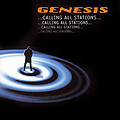


Last Genesis Studio album from 1997. Remastered Version from 2007 with new Stereo Mix.
Review available
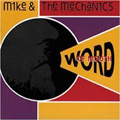

Mechanics-Album from 1991, contains the Hit-Singles Word Of Mouth and Everybody Gets A Second Chance.